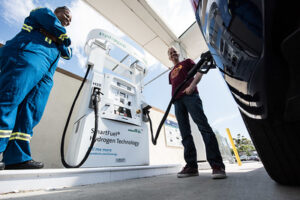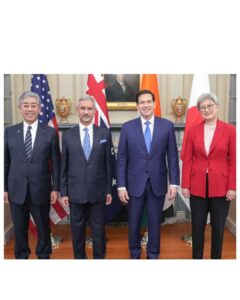
International Solar Alliance and Energy Security
Introduction
Global prosperity and national well-being are ensured by two interrelated pillars: energy security and environmental sustainability. For economic growth, social advancement, and national security, energy sources must be accessible, affordable, and reliable. Dependence on fossil fuels, however, poses substantial risks and vulnerabilities, from supply outages and price volatility to geopolitical unrest and environmental deterioration. In this environment, a global force known as the International Solar Alliance (ISA) has emerged to promote renewable and clean energy sources, particularly solar power. Ensuring energy security and enabling a sustainable future are made possible by the ISA’s dedication to encouraging solar energy adoption and minimizing reliance on fossil fuels.
What is Energy Security?
To meet its economic and social needs, a nation must be able to provide a consistent and stable supply of energy. Energy security refers to a nation’s ability to handle any disruptions or risks associated with energy supply and demand, accessibility, cost, and acceptability of energy sources. Economic stability, national security, and social welfare depend significantly on energy security. Dependence on fossil fuels, such as coal, gas, and crude oil, poses serious challenges to energy security, including price volatility, supply disruptions, and environmental issues. Adopting sustainable alternatives and diversifying one’s energy supply is essential to guaranteeing long-term energy security.
Significance of Energy Security
- Energy is a vital component of businesses, transportation, and agriculture and a key driver of economic activity. A secure and affordable energy supply is crucial for sustaining economic stability, attracting investments, and promoting economic progress. Energy security reduces an economy’s sensitivity to fluctuations in prices and supply, fostering a favorable business environment and generating employment possibilities.
- Energy security and national security are interconnected. Countries that rely heavily on foreign energy supplies may be more susceptible to geopolitical unrest, supply disruptions, or price manipulation by countries that export energy. Countries can increase their energy independence, lower geopolitical risks, and protect their interests in national security by diversifying their energy sources and expanding indigenous energy resources.
- To guarantee that everyone has access to reasonably priced and dependable energy services, energy security is crucial. Billions of people worldwide suffer from energy poverty, which impedes socioeconomic advancement and exacerbates inequality. By strengthening energy security, nations may increase access to clean and contemporary energy options, improve populations’ quality of life, and promote healthcare, education, and economic opportunities.
- The pursuit of environmental sustainability is inextricably tied to the quest for energy security. Fossil fuel combustion for energy production causes air pollution, climate change, and damage to the environment. The use of renewable energy sources, which are sustainable and low-carbon, encourages environmental preservation, lowers greenhouse gas emissions, lessens the effects of climate change, and safeguards natural resources for future generations.
- Countries that have secure energy supplies are better prepared to withstand emergencies like natural disasters and disruptions to their energy infrastructure. A nation’s capacity to handle unforeseen events and recover from them is improved by diversifying its energy sources, making investments in resilient energy infrastructure, and adopting energy efficiency and conservation measures. For important services like hospitals, emergency response, and communication during times of crisis, reliable and redundant energy systems are essential.
- A crucial element of sustainable development is energy security. It aids in achieving the Sustainable Development Goals (SDGs) of the United Nations by supporting economic growth (SDG 8), combating climate change (SDG 13), and ensuring that everyone has access to modern energy services (SDG 17). Energy security may help nations progress their sustainable development objectives and build a more wealthy and inclusive future.
Rise of International Solar Alliance (ISA)
The International Solar Alliance (ISA) emerged as an unparalleled worldwide project that aims to accelerate the adoption of solar energy and reduce dependence on fossil fuels. The rise of the ISA can be understood through its background, formation, objectives, and membership.
Background and formation of ISA
The United Nations Climate Change Conference (COP21), which was held in Paris in 2015, saw the creation of the International Solar Alliance (ISA). India and France, both of which have a strong commitment to renewable energy and sustainable development, co-founded the program. The ISA was established as a result of the urgency of the transition to clean and sustainable energy sources and the necessity to solve the global issues posed by climate change.
Objectives and Vision of ISA
The International Solar Alliance’s (ISA) fundamental objective is to promote the use of solar energy and make it easier for large-scale solar projects to be implemented to combat energy insecurity, lessen greenhouse gas emissions, and realize sustainable development objectives. The ISA wants to encourage the adoption of solar energy by member nations by attracting investment, fostering technology transfer, and building capacity. Its goal is to establish a global forum for solar resource-rich nations to work together on common problems and use solar energy as a major force behind sustainable development.
Membership and Geographical Focus of ISA
The International Solar Alliance (ISA) follows a membership-based business model. As of now, over 120 nations between the Tropics of Cancer and Capricorn have joined, demonstrating the vast support and engagement it has attracted. These nations share an interest in utilizing solar energy for sustainable development and are distinguished by their wealth of solar energy resources. The ISA places a strong emphasis on diversity and promotes participation from nations with abundant solar resources as well as those with high potential for solar energy. To work together on solar energy initiatives, it also collaborates with global organizations, business entities, and other stakeholders.
The ISA’s establishment and expansion demonstrate how solar energy is becoming increasingly important on a worldwide scale as a workable and long-term solution to energy issues and the fight against climate change. The ISA establishes a platform for coordinated action and knowledge sharing by bringing together nations from various socioeconomic and geographic backgrounds, allowing member nations to draw on one another’s experiences, knowledge, and resources.
The ISA’s growth has also been aided by the unwavering leadership and dedication shown by India and France, the alliance’s co-founders. Both nations have established challenging renewable energy goals and made notable advancements in the deployment of solar energy. Other countries have been moved by their shared dedication to solar energy and vision, which has resulted in the broad adoption of the ISA and its goals.
The ISA’s emphasis on solar energy also fits with the global shift to a low-carbon economy. Solar power has become increasingly competitive in terms of price, effectiveness, and scalability. The use of solar energy has been pushed further by falling solar technology costs, improvements in energy storage, and grid integration. The ISA is aware of these trends and is working to make the transition to a sustainable and resilient future of energy more quickly.
ISA’s Role in Advancing Energy Security
The International Solar Alliance plays a crucial role in advancing energy security through its diverse initiatives and programs.
- Facilitating Solar Project Development: The ISA fosters the growth of solar projects by encouraging information exchange, sharing best practices, and transferring technological know-how among member nations. To accelerate the implementation of solar energy, it offers a platform for project collaborations and encourages joint ventures and partnerships.
- Mobilizing Finance for Solar Investment: The high initial costs of solar energy are one of the biggest challenges to its widespread adoption. Through various strategies, including developing specialized funding instruments, collaborating with global financial institutions, and promoting innovative financing models, the ISA seeks to raise money and investments for solar projects.
- Technology Collaboration and Knowledge Sharing: The ISA promotes technological collaboration as well as sharing of information among its member nations. It encourages programs for capacity building, research, and the transfer of solar technologies. The ISA promotes technological improvements and cost reductions in solar energy by exchanging knowledge and best practices.
- Policy and Regulatory Support for Solar Energy: The ISA promotes legislative and policy frameworks that encourage the use of solar energy. It aids member nations in developing and putting incentives and policies in place to encourage the use of solar energy. These can include simplified permit processes, net metering, tax incentives, and feed-in tariffs. The ISA helps remove obstacles to solar energy growth, promotes investment, and increases energy security by establishing a supportive policy climate.
- Promotion of Sustainable Development: The ISA acknowledges the connection between energy security and sustainable development. The alliance assists in accomplishing the Sustainable Development Goals (SDGs), such as climate action (SDG 13), partnerships for the objectives (SDG 17), and access to cheap, clean energy (SDG 7). Solar energy promotes environmental sustainability by lowering greenhouse gas emissions, reducing air pollution, and battling climate change. The ISA promotes economic development, the reduction of poverty, and an improvement in quality of life while also enhancing overall energy security.
Case Studies of Successful ISA Projects
The International Solar Alliance (ISA) has launched various initiatives across the globe that demonstrate the effective use of solar energy and its beneficial effects on sustainable development. The following case studies highlight a few of these noteworthy ISA projects:
Solar Parks in India:
India, a co-founder of the ISA, has made incredible strides in the deployment of solar energy. Large-scale solar projects in India have been pushed by the Solar Parks initiative, which is backed by the ISA. Multiple solar power plants are being developed in selected areas with high solar energy potential, known as solar parks. These parks offer the necessary infrastructure and a supportive setting for the development of solar projects, attracting capital and encouraging the use of renewable energy. An excellent example of an ISA-supported project that boosted India’s solar energy capacity and significantly reduced carbon emissions is the Bhadla Solar Park in Rajasthan, India.
Solar Home Systems in Uganda:
The ISA has made it easier to install solar household systems in Uganda, especially in rural and remote areas with little access to power. The ISA has worked with the Ugandan government and local partners as part of the “Solar for All” program to offer solar power options to off-grid families. These solar home systems enable people to access clean and dependable electricity for lighting, device charging, and small appliance power via solar panels, batteries, and energy-efficient appliances. With higher illumination and later bedtimes, the initiative has increased energy access, improved livelihoods, and empowered communities, especially among women and children.
Solar Irrigation in Senegal:
The ISA has assisted Senegal in building solar-powered irrigation systems to increase agricultural output and alleviate issues with water constraints. In remote farming villages, the initiative includes installing solar panels, water pumps, and drip irrigation systems. Farmers may acquire a dependable and sustainable water supply by employing solar energy to power irrigation, enabling year-round cultivation, higher agricultural yields, and improved lives. Senegal’s solar irrigation project has reduced the country’s reliance on fossil fuel pumps, cut greenhouse gas emissions, and increased water and energy efficiency in agriculture.
Solar Microgrids in Bangladesh:
The ISA has been supporting solar microgrids in Bangladesh to supply villages that are off the grid and underserved with electricity. The microgrid systems, which provide for the energy requirements of nearby homes, companies, and institutions, are made up of solar panels, battery storage, and distribution networks. These solar microgrids have replaced kerosene lamps and diesel generators, giving clean and reasonably priced electricity to isolated communities. The project has had a favorable effect on local businesses, healthcare, education, and government, opening doors for social and economic advancement.
Solar Street Lighting in Fiji:
To strengthen the infrastructure for public lighting and increase safety and security, the ISA has financed the installation of solar street lighting systems in Fiji. Solar-powered streetlights have been installed in both urban and rural regions, reducing dependency on grid-based electricity and lowering carbon emissions. Along with improving lighting in public areas, the initiative also reduced energy costs, increased traffic safety, and helped the nation achieve its sustainable development goals.
Rewa Ultra Mega Solar Park, India:
The Rewa Ultra Mega Solar Park in Madhya Pradesh, India, one of the ISA’s signature projects, is an ideal model solar energy facility. One of the world’s most significant single-site solar power projects, the park has a capacity of 750 MW. Significant foreign investments have been attracted, which has contributed to lowering solar rates and increasing the affordability and viability of solar energy. In addition to helping India meet its goals for renewable energy, the Rewa Solar Park has boosted regional economic growth and provided job opportunities.
Scaling the Solar Program in Zambia:
The Scaling Solar program in Zambia, which aims to encourage private sector participation in solar energy projects, has received financing from the ISA. With a total capacity of 78 MW, the program has successfully tendered and constructed two utility-scale solar power projects. The projects attracted worldwide developers and investors since they had been through open and competitive bidding processes. The Scaling Solar program has helped Zambia diversify its energy supply and provide access to clean, affordable electricity while demonstrating the efficiency of public-private partnerships in accelerating solar energy implementation.
Solar Energy for Agriculture and Livelihoods (SEAL) Program, Cambodia:
The SEAL program, funded by the ISA, is dedicated to encouraging the use of solar energy for agricultural purposes in Cambodia. The project provides solar-powered irrigation systems to marginalized farmers to improve their quality of life. Substituting these systems for conventional diesel pumps decreases operational expenses and environmental effects. Thanks to the SEAL program, farmers have been able to produce more crops, prolong growing seasons, and use less water. Additionally, it has made it easier for rural residents to get energy and given farmers the tools they need to adapt to climate change.
Floating Solar Power Plants, Seychelles:
In Seychelles, an island nation particularly vulnerable to climate change, the ISA has financed the construction of floating solar power facilities. The floating solar power plants, situated on freshwater reservoirs, have addressed the issues associated with shortages of land and maximized the use of solar energy. These facilities have increased the nation’s grid’s ability to handle energy from renewable sources, decreased the dependency on imported fossil fuels, and reduced carbon emissions. The initiatives not only improved the nation’s energy security but also showed creative ways to get beyond geographical restrictions on the use of solar energy.
Challenges before International Solar Alliance
As it strives to promote the use of solar energy and sustainable development, the International Solar Alliance (ISA) faces many challenges.
Financing and Investment:
Sourcing sufficient funding for solar energy projects is one of the most significant challenges the ISA has to contend with. While solar technology costs have come down over time, many nations, especially those with inadequate financial resources, still have difficulty getting access to financing.
Building capacity and transferring technology:
Solar energy project execution requires both technology transfer and capacity building. Many developing nations lack the infrastructure and technical know-how to successfully harness solar energy. The ISA should prioritize increasing knowledge exchange, the transfer of best practices, and capacity-building initiatives to enable member nations to design and carry out their solar projects.
Policy and Regulatory Frameworks:
A favorable policy and regulatory environment must be developed to promote the use of solar energy. The ISA should keep pushing for favorable regulations, such as feed-in tariffs, incentives, and simplified permit procedures, to promote the growth of solar energy installations. By exchanging experiences, offering direction, and fostering policy coherence at the national and international levels, the alliance can also help member nations with policy formulation and implementation.
Integration with Existing Energy Systems:
There are logistical and technical difficulties in integrating solar energy into current energy systems. Solar energy is sporadic and weather-dependent, necessitating efficient energy storage and grid integration solutions. The ISA should work with member nations and pertinent stakeholders to create smart grid technology, energy storage options, and demand-side management plans. The ISA can assure the dependable and steady functioning of solar energy systems, easing the transition to a sustainable energy future, by concentrating on grid modernization and the integration of renewable energy sources.
Expanding Membership and Collaboration:
The ISA should keep growing its membership base and intensify cooperation with international organizations, regional alliances, and the commercial sector to increase its impact. The ISA may benefit from various experiences, resources, and knowledge by cooperating with a broader range of nations and stakeholders. The ISA’s efforts can be further amplified by working with other projects, such as the Sustainable Energy for All (SEforALL) initiative and the UNFCCC, to promote international collaboration on renewable energy and sustainable development.
Future Prospects of International Solar Alliance
The ISA has an optimistic future ahead of it. The opportunity for solar energy to change the world’s energy landscape is enormous as it grows more technologically and cost-competitively competitive.
Accelerating Solar Energy Deployment:
Solar electricity is becoming more widely available and affordable due to ongoing cost reductions in solar technology and rising efficiency. The ISA can make use of this development to encourage more widespread adoption of solar energy inside and outside of its membership. The ISA can make significant contributions towards accomplishing the world’s renewable energy goals by helping the development of large-scale solar projects, fostering decentralized solar solutions, and fostering creative financing methods.
Energy Access and Electrification:
The ISA may prove highly effective in advancing solar energy to combat energy poverty and promote electrification initiatives. The partnership can help install solar mini-grids and solar home systems, bringing clean and inexpensive electricity to those with limited resources, by concentrating on off-grid and isolated locations. The ISA’s initiatives can aid in closing the energy access gap and raise the standard of living for millions of people worldwide.
Decentralized Energy Systems:
The ISA can encourage the creation of distributed solar energy systems including rooftop solar, community solar projects, and microgrids. Through these programs, communities can become more involved in the generation and use of energy while also reducing transmission losses and boosting energy security. The ISA can help create a future where energy is more evenly distributed and sustainable by encouraging the adoption of decentralized energy systems.
Integration with Other Renewable Energy Sources:
Although solar energy offers a lot of potential, it is critical to understand the value of a diversified and integrated energy mix. The ISA can promote collaboration and synergies between solar power and other renewable energy sources, including wind, water, and biomass. The ISA can create a comprehensive and sustainable approach to meet energy demands while minimizing environmental impacts by supporting hybrid energy systems and encouraging cross-sectoral collaborations.
International Cooperation and Partnerships:
The international collaboration and relationships of the ISA are its core strength. To maximize resources, knowledge, and experiences, the alliance can broaden its partnerships with governmental bodies, international organizations, academic institutions, and the private sector. The ISA can acquire additional capital, technical expertise, and market insights by forming strategic alliances.







